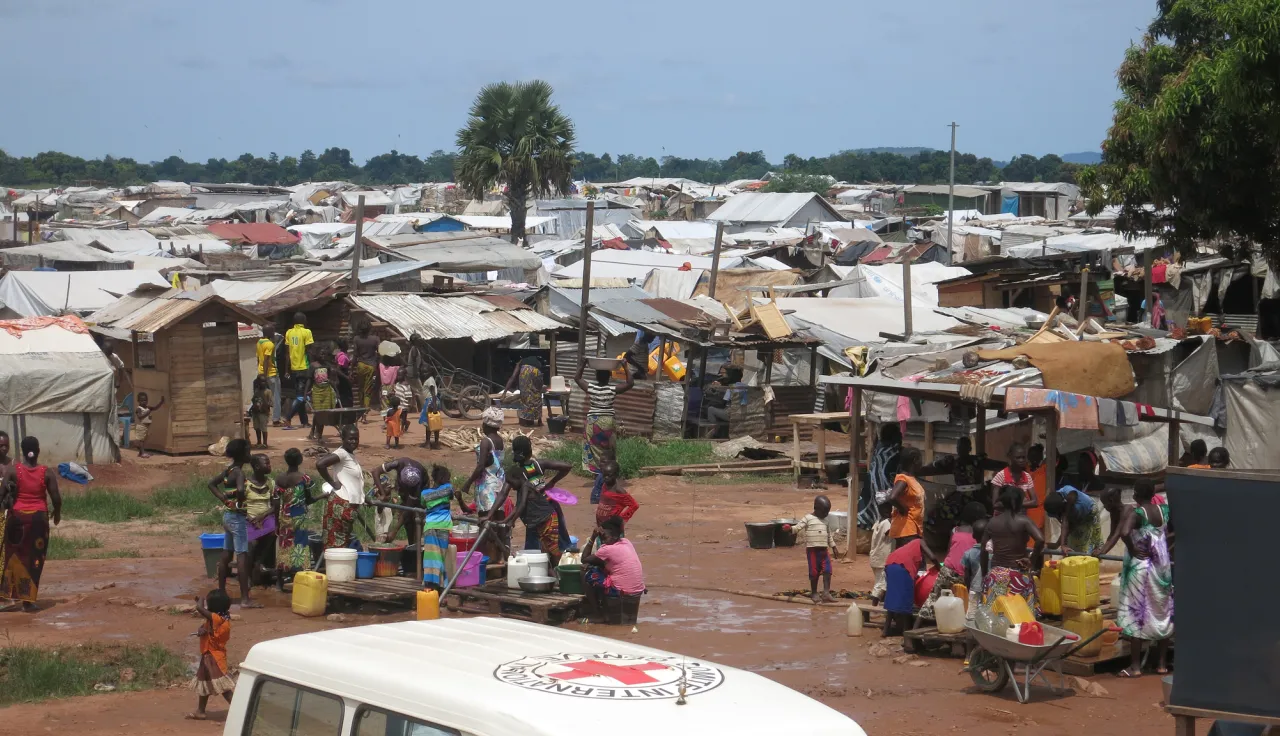Displaced in the Central African Republic: Between a rock and a hard place

Hundreds of thousands of displaced people in the Central African Republic (CAR) are still waiting to return home and resume normal life. Already severely weakened by the effects of the conflict, they now also have to contend with armed men in their midst, while accidental fires have caused devastation in camps in Kaga Bandoro, Batangafo and Bambari, compounding the hardship.
Several people died or were injured in the fires in Bambari, in the centre-east of the country, and property suffered extensive damage, with over half of the temporary shelters, along with the belongings of their already vulnerable occupants, reduced to ashes. Fires wreaked similar havoc in Kaga Bandoro and Bantagafo in northern CAR, but thankfully with no loss of life.
"I had no time to grab my possessions when the fire broke out. We lost everything we had to live with in this camp: clothes, bedding, and essential items given to us by humanitarian organizations. What will become of us now?" asked Jeannette Igakola, a widow living in the Évêché camp in Kaga Bandoro.
Thousands at risk nationwide
The plight of displaced people in the capital, Bangui, is hardly better. Poor access to clean water and sanitation leaves them prey to diseases such as malaria and diarrhoea. Food shortages are leading to the risk of malnutrition.
Many more people are currently displaced throughout the CAR. Some of them have been taken in by local families, while others are camping out in the bush in the harshest of conditions. Continuing violence in their home areas is preventing those who would like to return from doing so. Others would rather wait and see how the situation develops.
"At present, there are some 435,000 displaced people in the CAR living in extreme hardship. Their dearest wish is to go home as soon as the situation allows," said Jean-François Sangsue, head of the ICRC delegation in the CAR.

Kaga Bandoro, Central African Republic. Displaced people in the Evêché camp in Kaga Bandaro have nowhere else to go after fire ravaged the site. They have no choice but to rebuild, yet again, their lives here in utter destitution. CC BY-NC-ND / ICRC / F. Sambia
Between November 2015 and January 2016, the ICRC, where appropriate in conjunction with Central African Red Cross volunteers:
- performed more than 250 surgical operations and conducted more than 1,500 consultations at Bangui community hospital;
- conducted more than 10,000 consultations in Kaga Bandoro, including 1,000 antenatal check-ups;
- provided more than 50 victims of sexual violence in Kaga Bandoro with psychosocial support;
- treated more than 1,900 malaria cases in Birao;
- enabled more than 100 people separated from their families by the conflict to speak to their loved ones by phone, and reunited three of them with their families;
- delivered water daily to more than 53,000 displaced people in Bangui, Kaga Bandoro and Bambari;
- ensured 10,000 inhabitants of Ndélé received a clean water supply through the urban water distribution network;
- provided more than 7,500 malnourished children in Kaga Bandoro with food;
- distributed food rations to more than 20,000 displaced people in Bangui and more than 7,000 others along the route between Kaga Bandoro and Ouandago;
- organized awareness-raising sessions for 45 journalists and more than 100 community leaders on the need to protect medical facilities and personnel;
- familiarized more than 30 trainee officers of the Central African armed forces and 45 members of armed groups with the basic principles of international humanitarian law.
In addition, ICRC delegates visited more than 500 detainees throughout the country. Some 400 of those visited received hygiene items for general purposes and personal use.



